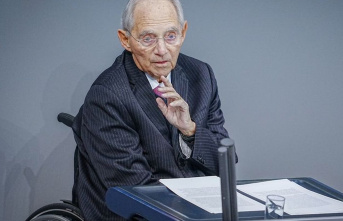More than every third war refugee from the Ukraine would like to stay in Germany either forever or at least for several years. This is shown by the results of a representative survey presented in Berlin on Thursday. Of the more than 11,000 Ukrainians who took part, 26 percent said they wanted to live in Germany forever. Eleven percent of war refugees want to stay for several years.
Around a third of the refugees (34 percent) want to leave Germany after the end of the war. 27 percent of respondents were undecided. Only two percent of Ukraine refugees plan to leave the country again within a year.
At the time of the survey, 17 percent of the refugees of working age had a job. According to the study, most of them - 71 percent - pursued a job that required a university or professional qualification. "We rate this proportion as relatively high," also in comparison to previous experiences with other refugee groups, said Herbert Brücker from the Institute for Labor Market and Occupational Research.
Language skills still little available
With increasing language skills, the proportion of those in employment will probably increase significantly, he predicted - especially since the vast majority, according to their own statements, are aiming for a professional activity. Only five percent of the Ukraine refugees stated in the survey that they had a good knowledge of German. Half of the Ukrainians were already attending a German course at this point.
A second important factor when looking for paid employment is childcare. Almost half of the adult refugees (48 percent) came to Germany with underage children.
Two thirds of those who have fled to Germany come from regions in Ukraine that have been particularly hard hit by the war. 60 percent of the refugees name family members, friends and acquaintances who already live here as the most important reason for choosing Germany as the destination country. Other frequently mentioned motives are respect for human rights, the welfare system, the education system, the welcoming culture and the economic situation in Germany. 18 percent of the refugees stated that chance had brought them to Germany.
The research center of the Federal Office for Migration and Refugees (Bamf) and the German Institute for Economic Research contributed to the study "Refugees from Ukraine in Germany - flight, arrival and life". The survey ran from August to October.
Traces of the war noticeable
It is clear to see "that war and flight have left traces that continue to have an impact," said Nina Rother from the research center in Bamf. On a scale of 1 to 10, the respondents rated their life satisfaction at 5.8, which is significantly lower than the rest of the population in Germany, where an average value of 7.5 is achieved.
As of November 21, the Central Register of Foreigners recorded 1,026,599 people who had entered Germany since February 24 in connection with the war in Ukraine. Ukrainian refugees can enter Germany without a visa and receive temporary protection without having to apply for asylum. You can receive Hartz IV benefits, or soon citizen income.
Around 80 percent of the adult refugees from Ukraine are women. Due to the general mobilization, men of military age are only allowed to leave the country in very limited exceptional cases. On average, refugees from Ukraine are younger and better educated than the average population in their country of origin.
The clear majority of Ukrainian refugees stated that they felt welcome when they arrived in Germany. According to the study, this was entirely the case for about a third of the refugees. 43 percent of those surveyed stated that they felt mostly welcome at the beginning. Only a minority of seven percent does not feel welcome at all or hardly at all.












